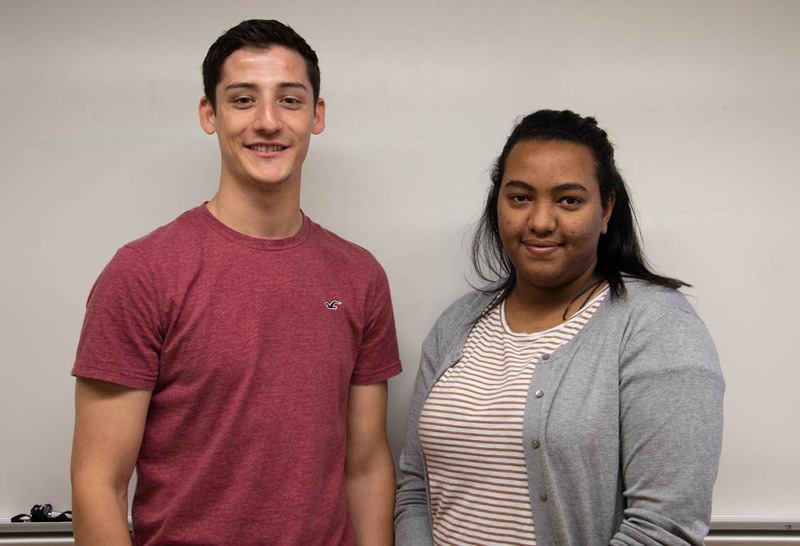Science majors conduct biomedical research

CHADRON – After spending the summer working on advanced biomedical research projects, two Chadron State College students, Wacey Gallegos from Ainsworth, Nebraska, and Lelisse Umeta, from Addis Ababa, Ethiopia, had the opportunity to present results of their work at a recent science conference in Nebraska City.
Gallegos and Umeta are among a group of 29 undergraduate science students from across Nebraska in the 2019 class of IDeA Networks of Biomedical Research Excellence (INBRE) scholars. A $17 million grant from the National Institutes of Health funds INBRE in Nebraska. The program was created in 2001 to provide research opportunities for undergraduate students and a pipeline for them to continue into graduate research.
INBRE is administered through the University of Nebraska Medical Center, said Professor Dr. Ann Buchmann, who advises program participants at Chadron State. INBRE provides funding for students to conduct research on campus and for full-time summer lab work in Omaha or Lincoln, Buchmann said.
Gallegos worked this summer at a lab in Omaha affiliated with Boys Town on a project to determine whether children with hearing loss use the same parts of their brains as non-deaf children in learning tasks that don’t involve hearing, Buchmann said. Gallegos said his part of the research involved analyzing data from magnetoencephalography (MEG) scans conducted during visual selective attention tests.
“We are the first lab to look at the underlying neurological mechanisms that may differ between children with normal hearing and children with mild to severe hearing loss,” he said.
Preliminary results indicate that hearing loss changes nerve cell responses during visual tasks involving selective attention, but when a child with hearing loss uses a hearing aid for longer periods a normalization effect occurs, Gallegos said.
During the school year Gallegos will be continuing work on a project to determine the role that certain proteins play in development of the central nervous system, Buchmann said. That project has already shown that fruit flies that lack a particular protein have behavioral and learning differences in comparison with other fruit flies, she said.
Umeta’s research focused on a type of chronic leukemia which affects B-lymphocytes, a type of immune system cell that helps fight infections. The disease causes an overproduction of an abnormal type of B-cell that doesn’t function normally, leaving the patient vulnerable to infections. She studied the effects of a drug that inhibits production of three kinds of enzymes important in B-cell survival.
Umeta said she chose the subject because of a longstanding interest in studying cancers and how drugs work. “I learned a lot from researching,” she said. During the school year she will continue working on a project to determine the effects of curcumin, a chemical found in tumeric, on breast cancer cell survival, Buchmann said.
INBRE provides a great opportunity to prepare for graduate school, said Gallegos, who plans to earn a PhD in neuroscience and pursue a research career.
Umeta agreed. “The process was stressful but I had a lot of people help me gain the confidence I needed to present something that I was passionate about, so it was worthwhile,” she said.
Umeta said she will participate in INBRE again next summer, and continue research projects during her final two years at CSC. After graduation she hopes to attend medical school and follow her research interests.
“It is very important to have programs like INBRE for students like me who would like to do biomedical research because it will help prepare us with skill sets for graduate school,” she said.
Category: Campus News, Physical and Life Sciences, Student Awards & Achievements
